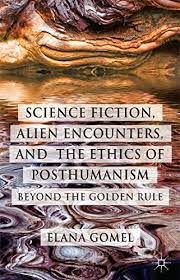Elana Gomel, Science Fiction, Alien Encounters
and the Ethics of Posthumanism:
Beyond the Golden Rule
excerpt

Science Fiction, Alien Encounters and the Ethics of Posthumanism: Beyond the Golden Rule Publisher: Palgrave MacMillan Date: June 2014 ISBN: 9781137367631 |
Rather than seeing the alien as an allegory or delving into the psycho-politics of individual texts, I have tried to link the aliens’ presence in our culture with the growing demand for articulating a new ethics that will no longer depend on the increasingly beleaguered discourse of humanism. This discourse is still very strong despite the sustained philosophical critique of the last half-a-century. We may echo Foucault’s wish for the speedy death of the Universal Man in our scholarly publications. But when it comes to the practical applications of posthumanism, whether in animal studies, disability studies, or evaluation of new biotechnologies, we all-too-often fall back upon the rhetoric of the Golden Rule, empathy and human rights.
Why is it a problem?, one might ask. Do I really wish for a society of “mindblind” supermen? Am I on the side of O’Brien in his philosophical torture of Winston Smith? Am I willing to discard the Declaration of Human Rights?
No, not necessarily. But the future is coming, whether we will it or not. Humanism went bankrupt in Auschwitz and the Gulag. Despite the rising tide of religious fundamentalism, religion can no longer offer a guide to living in the new world. As Francis Fukuyama glumly acknowledges, “our posthuman future” is not likely to be held back for very long by the rearguard fights against genetic engineering, neuroscience, or Big Pharma. We are living in an age where “the posthuman has become the only possible continuation of the human” (Johns 397).
But posthumanism is not merely a technological fix to be applied to the human body and mind. If it is to usher in a new age, it has to find a new position from which to speak of social and individual conduct. Popular reiterations of posthumanism often fall short of such a goal, simply reflecting extant positions on the political spectrum. The libertarian posthumanism of the Singularity Institute, for example, promises to enhance individual well-being or guarantee longevity, but has little to say about the inevitable social inequality that would result from its programs. Democratic transhumanism, on the other hand, explicitly attempts to connect the biotechnical revolution with traditional left-wing politics. Neither, I believe, goes far enough. They fall short when they regard posthumanism as a platform instead of epistemology.
Posthumanism, in my view, is a negative and subversive potential in humanism, always present, always working against its moral grain, always striving to unmake its verities, and challenge its platitudes. It is a restless, inquisitive, contrary spirit that dares to go where no one has gone before. And what better vehicle for such questions than SF?
SF is a literary genre, but it is also more than that. It is a way of thinking and even of living in the world which embraces the radical skepticism of science, while not being bound by the factual constraints of the physical universe. Brash and unsettling, SF has always been more about asking questions than about offering answers. In fact, where SF abandons its mission of challenging the existing order, defamiliarizing what is familiar, playing a mischievous Mephistopheles to reality, it becomes something else: a pious allegory or a political utopia. SF is under no obligation to articulate a positive ethics of posthumanism. But it is called upon to expose the inadequacies, lies, and evasions of humanist ideologies. And it does so through its greatest invention: the alien.
The alien in SF has many roles to play. It can be an evil enemy, confirming our smug self-image as virtuous and good (Chapter 1). It can be a space brother, embodying the ideological uniformity of a humanist utopia (Chapter 2). It can be a stealthy encroachment of alterity, eating away at the integrated humanist self (Chapter 3). It can be an allegory of Western guilt over the ravages of imperialism, resurrecting the myth of the “noble savage” (Chapter 4). And it can be an icon of the totally Other, of the unknown future and the incomprehensible past, of the radical strangeness of the inhuman within and without the stuffy confines of humanism (Chapters 5 and 6).
In evoking the Other, SF may sometimes sound like the echo of the mythical time when man first looked up to the stars and saw the face of an alien god. There is an obvious danger in this, epitomized by alien cults and conspiracy theories. But SF is not fated to degenerate into a “hand-me-down” creed. While secular humanism and religious fundamentalism are locked in a futile stand-off, SF can be a mediator. It can speak the language of both religion and science. It can revive the poetic insights of theology, while accepting the philosophical naturalism that underpins the advances of technology. It can call for metaphysical transcendence in the physical world.
Aliens may not exist or we may never encounter them. But the presence of the inhuman, of the ontologically Other, within humanity and in our relation with the universe, is undeniable. Only through acknowledging and coming to terms with this presence can ethics transcend the tired rhetoric of human rights and anthropocentric morality. But this acknowledgement necessitates a profound ontological transformation of our most cherished notions of identity, freedom, and empathy. What SF narratives of alien invasions, human-alien hybridization, and scientific transcendence show is that we always have choices to make — even when “we” are no longer human.
Copyright © 2014 by Elana Gomel
Proceed to the Discussion...

